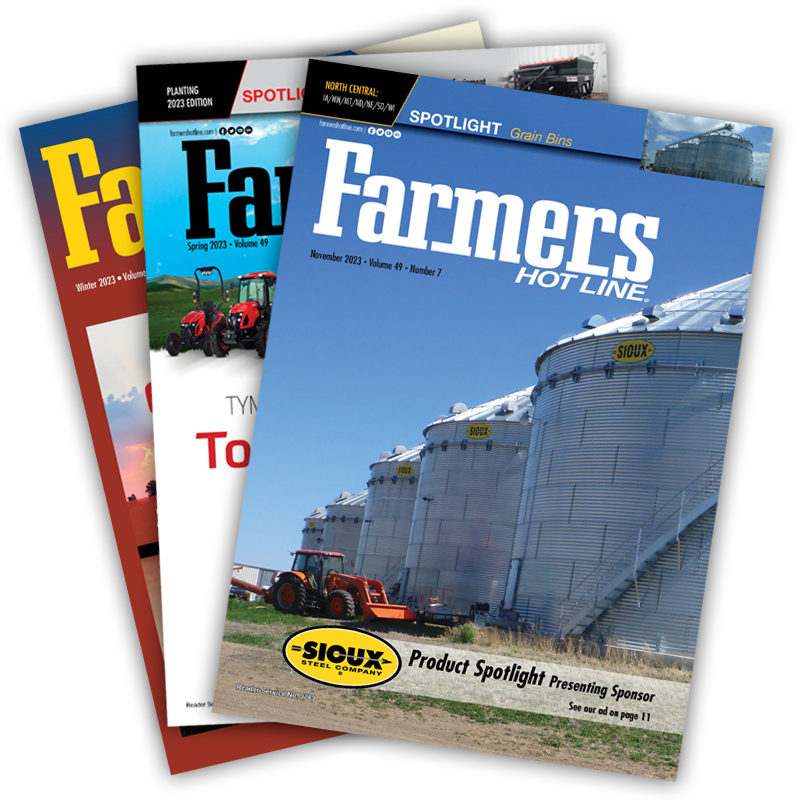A Farmer’s Final Gift
Long After He Lost His Life to Cancer, an Iowa Farmer’s Legacy Lives On
In April 2021, Brad Plunkett, an Iowa farmer, did what he normally did for years — he woke up before the sun, had a cup of coffee in his still quiet kitchen, ate some breakfast, bundled himself up for the mid-30-degree morning, filled a thermos with the remainder of the coffee, kissed his wife, Karmen, goodbye and prepared to work his 2,000-acre corn and soybean farm.
Later that morning, Plunkett would call his son, Ryan, who helped him farm, to tell him that he had hit a fence post with his tractor, and that he “didn’t feel right.” At first, Plunkett chalked his complaints up to lingering symptoms from COVID-19, but his son, Ryan, knew something was far more wrong.
“Usually my dad was up at 5 a.m., but if I could handle things, he wasn’t coming out of the house until noon,” Ryan said.
When those symptoms persisted, Plunkett finally went to the doctor and was diagnosed with glioblastoma, a common and aggressive type of brain cancer, that has a poor prognosis for survival.

Two days after his diagnosis, the 55-years-old Plunkett had surgery, then continued with chemo and radiation treatments.
According to Ryan, his father was doing well and in good spirits, post-surgery, but also knew that it would be a long road back to farming for his father.

Still, he had hope.
With the goal of getting back to the fall harvest, Plunkett went to an out-patient rehabilitation facility called “On With Life,” in Ankeny, Iowa, a place where patients with any type of neurological disorder can go to recover. In short, On With Life’s out-patient facility takes anyone who has suffered a traumatic brain injury, from Parkinson’s disease to stroke patients to those, like Plunkett, with brain tumors.
“He was a farmer through and through,” Gail McGaughy, Plunkett’s therapist, said. “So, he was getting back to harvest.”
What that meant was that Plunkett would have to (re)-learn how to climb the 10 vertical steps that would lead to his combine cab. The problem was that On With Life didn’t have anything remotely like what was needed for Plunkett to regain his balance to navigate the stairs. Instead, they had playground steps that in no way mimicked the steps to a combine, and a 1950s tractor, according to McGaughy.
But farmers are nothing if not problem solvers.

It was then, according to Ryan, that his father told McGaughy, they needed to modernize their equipment.
“He fleshed out a picture on a napkin that envisioned what an updated version of a combine or tractor would look like [for patients],” Ryan said.
In Plunkett’s version, there were two set of steps leading up to the cab of a combine or tractor so that a therapist could walk alongside the patient and hold onto them to help the patient maintain their balance, while keeping patients’ safe. To begin the process, Plunkett told McGaughy that he would donate “half a load of corn,” (the equivalent of $2500) if that would help get them started.
When Plunkett died in January of 2022, the family honored the donation to continue Plunkett’s quest to help other farmers with physical therapy.

Although he was unable to see his vision come to fruition, On With Life didn’t give up on the project. After a year-long back and forth between the organization and Plunkett’s family, McGaughy said everyone involved was satisfied with the final version.
“It was a life-size model of a tractor and combine cab, seven feet above the ground, that would aid farmers who needed physical therapy ... to help them regain their balance,” Ryan said.
In March 2023, McGaughy reached out to John Deere’s donation division, and that was when she first talked to Glenn Pope, a senior staff engineer, about Plunkett’s story and subsequent vision. Pope told McGaughy he would donate the combine, he just needed to come up with the steps.
After receiving the request from On With Life, Pope met with his 20-person Quad Cities team and decided not only that it could be done, but that it needed to be done in memory of Plunkett, his family, and other farmers who would benefit.
The first order of business was to acquire a scrap combine cab from John Deere’s Harvester Works division in East Moline, Illinois, and a tractor cab, from its facility in Waterloo, Iowa. Then, Pope said, it was just a matter of reaching out to his internal people who had some free time.
Meeting twice a week, Pope and his team took the rough sketch and improved on it until they felt it was something they could present to On With Life.
“We sent Glenn some renderings of what it could be and ... they just went wild with it. They put in safety features of steps to get up and down ... bigger steps, smaller steps. They really outdid themselves,” McGaughy said.
Ryan agreed, saying “they made revisions to what my dad had drawn, had materials donated and it was unbelievable what they came up with.”
Once approved, Pope and his team began the tough work of bringing Plunkett’s vision to life. The team did the design work in July and August, then moved onto the build. By October 2023, Pope and his team were satisfied, and Pope had John Deere’s safety team assess the final product.
“We took all input and every effort to make it solid,” Pope said. That included installing 13 steps to the combine (at the exact height), hand rails for safety, another set of stairs for therapists, a steering wheel and throttle in the combine cab, bench seats so patients could rest and two doors for easy entrance and exit for both patients and therapists.
“As non-therapists, they thought of things that they should never have even thought about,” McGaughy said. “I’m really blown away by what they did ... they thought of so much.”
Pope and his team were on pace to install the therapy combine and tractor in Ankeny, Iowa, in December of last year, but as any Midwest farmer knows, winter weather can be unforgiving. The John Deere team put a hold on installing the “cab contraption,” as it became lovingly called during its creation, and it was finally installed during spring break of this year.
On site for the ribbon cutting and ceremony, was Plunkett’s family — from nuclear to extended, everyone in Plunkett’s family who could show up, did. But John Deere wasn’t done.

Once the installation was complete, the agricultural tractor company, gifted Ryan and his family with a gold key, with Plunkett’s name emblazoned on it.
To understand the significance of the gift is to understand the tradition behind it, which is, once a farmer has purchased a combine from the company (a cost of anywhere from $600,000 to $1 million), they are invited to come out to its Waterloo factory and watch the assembly. When finished, the farmer is invited to start the combine in the factory with the gold key. It is, those who have one say, an experience of a lifetime.
“My dad and I always talked about having a gold key, and now we have one,” added Ryan.
“If you’re in that community,” McGaughy said, “having a gold key is a huge deal, so that meant so much to him [Ryan].”
Now the therapy tractor and combine sit in the heart of Iowa, so that those farmers who need physical therapy, can use it. For Pope and his team, it was, he said, a fantastic project to be a part of and an honor.
“This is what it means to be part of a community,” Pope said. “It was a chance for us to use our talents and skills and free time that goes to someone else’s good, and is one of those rare career highlights you get to work on in your life.”
As for Ryan, it’s not surprising that his father orchestrated something that would help others.
“It’s just who he was. He put others before himself ... [and] never wanted recognition. He just wanted to help,” Ryan said. “It’s going to impact a lot of people ... not even two years later, he’s making a difference.”
With that comes a legacy for those in need, from someone they will never meet — a farmer who lost a battle, but created something that will live on for generations to come.


